Functionalism
William James was one of the major American psychologists during the mid to late 1800s.
- His classic textbook "The Principles of Psychology" became the standard text in psychology and served for the basis of functionalism.
- Functionalism was about how behavior works to help people live in their environment. Functionalists use methods, such as direct observation.
- While structuralists tried to break down mental processes into their smallest parts, functionalists thought consciousness was a more continuous and changing process.
- Functionalism influenced later psychologists and theories of human thought and behavior.
298
527 reads
CURATED FROM
IDEAS CURATED BY
The idea is part of this collection:
Learn more about personaldevelopment with this collection
How to apply new knowledge in everyday life
Why continuous learning is important
How to find and evaluate sources of knowledge
Related collections
Similar ideas to Functionalism
The Beginnings of Psychology
Psychology was not separate from philosophy until the late 1800s.
- During the 17th century, philosopher Rene Descartes introduced the idea of dualism - that the mind and body were two entities that interact to complete the human experience.
- While early philosophers relied on ...
History of Consciousness
- The French philosopher Rene Descartes theorized the idea that while the mind and body are separate, they do interact.
- Structuralists used introspection to analyze and report conscious sensations, thoughts, and experiences of their own minds. It was very subjective but inspired furt...
Psychology as a Separate Discipline
- During the mid-1800s, a German physiologist Wilhelm Wundt outlined many of the major connections between the science of physiology and the study of human thought and behavior.
- He viewed psychology as the study of human consciousness and tried to apply experimental methods to study ...
Read & Learn
20x Faster
without
deepstash
with
deepstash
with
deepstash
Personalized microlearning
—
100+ Learning Journeys
—
Access to 200,000+ ideas
—
Access to the mobile app
—
Unlimited idea saving
—
—
Unlimited history
—
—
Unlimited listening to ideas
—
—
Downloading & offline access
—
—
Supercharge your mind with one idea per day
Enter your email and spend 1 minute every day to learn something new.
I agree to receive email updates

